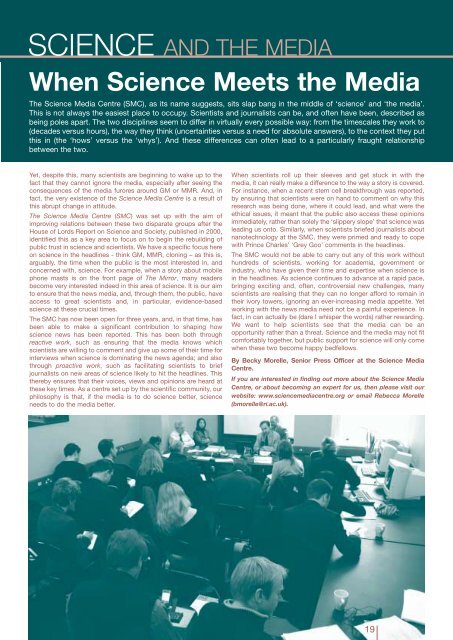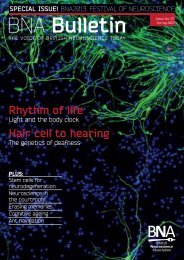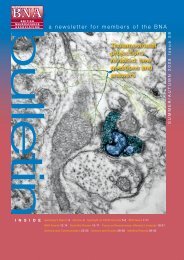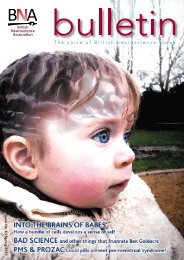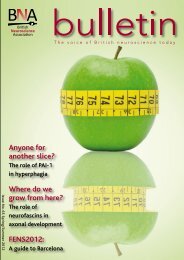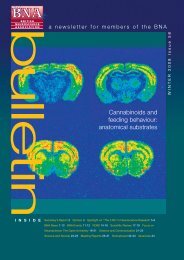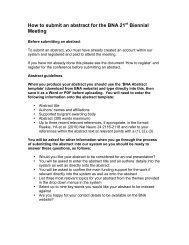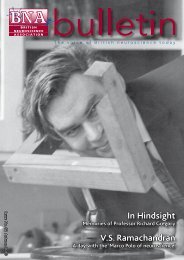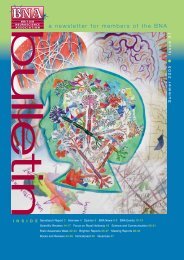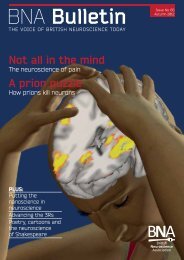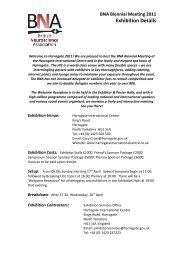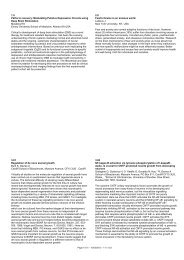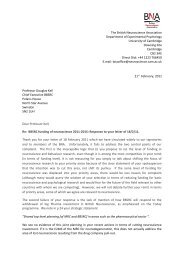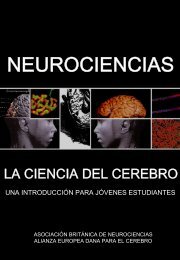a newsletter for members of the BNA - British Neuroscience ...
a newsletter for members of the BNA - British Neuroscience ...
a newsletter for members of the BNA - British Neuroscience ...
Create successful ePaper yourself
Turn your PDF publications into a flip-book with our unique Google optimized e-Paper software.
SCIENCE AND THE MEDIA<br />
When Science Meets <strong>the</strong> Media<br />
The Science Media Centre (SMC), as its name suggests, sits slap bang in <strong>the</strong> middle <strong>of</strong> ‘science’ and ‘<strong>the</strong> media’.<br />
This is not always <strong>the</strong> easiest place to occupy. Scientists and journalists can be, and <strong>of</strong>ten have been, described as<br />
being poles apart. The two disciplines seem to differ in virtually every possible way: from <strong>the</strong> timescales <strong>the</strong>y work to<br />
(decades versus hours), <strong>the</strong> way <strong>the</strong>y think (uncertainties versus a need <strong>for</strong> absolute answers), to <strong>the</strong> context <strong>the</strong>y put<br />
this in (<strong>the</strong> ‘hows’ versus <strong>the</strong> ‘whys’). And <strong>the</strong>se differences can <strong>of</strong>ten lead to a particularly fraught relationship<br />
between <strong>the</strong> two.<br />
Yet, despite this, many scientists are beginning to wake up to <strong>the</strong><br />
fact that <strong>the</strong>y cannot ignore <strong>the</strong> media, especially after seeing <strong>the</strong><br />
consequences <strong>of</strong> <strong>the</strong> media furores around GM or MMR. And, in<br />
fact, <strong>the</strong> very existence <strong>of</strong> <strong>the</strong> Science Media Centre is a result <strong>of</strong><br />
this abrupt change in attitude.<br />
The Science Media Centre (SMC) was set up with <strong>the</strong> aim <strong>of</strong><br />
improving relations between <strong>the</strong>se two disparate groups after <strong>the</strong><br />
House <strong>of</strong> Lords Report on Science and Society, published in 2000,<br />
identified this as a key area to focus on to begin <strong>the</strong> rebuilding <strong>of</strong><br />
public trust in science and scientists. We have a specific focus here<br />
on science in <strong>the</strong> headlines - think GM, MMR, cloning – as this is,<br />
arguably, <strong>the</strong> time when <strong>the</strong> public is <strong>the</strong> most interested in, and<br />
concerned with, science. For example, when a story about mobile<br />
phone masts is on <strong>the</strong> front page <strong>of</strong> The Mirror, many readers<br />
become very interested indeed in this area <strong>of</strong> science. It is our aim<br />
to ensure that <strong>the</strong> news media, and, through <strong>the</strong>m, <strong>the</strong> public, have<br />
access to great scientists and, in particular, evidence-based<br />
science at <strong>the</strong>se crucial times.<br />
The SMC has now been open <strong>for</strong> three years, and, in that time, has<br />
been able to make a significant contribution to shaping how<br />
science news has been reported. This has been both through<br />
reactive work, such as ensuring that <strong>the</strong> media knows which<br />
scientists are willing to comment and give up some <strong>of</strong> <strong>the</strong>ir time <strong>for</strong><br />
interviews when science is dominating <strong>the</strong> news agenda; and also<br />
through proactive work, such as facilitating scientists to brief<br />
journalists on new areas <strong>of</strong> science likely to hit <strong>the</strong> headlines. This<br />
<strong>the</strong>reby ensures that <strong>the</strong>ir voices, views and opinions are heard at<br />
<strong>the</strong>se key times. As a centre set up by <strong>the</strong> scientific community, our<br />
philosophy is that, if <strong>the</strong> media is to do science better, science<br />
needs to do <strong>the</strong> media better.<br />
When scientists roll up <strong>the</strong>ir sleeves and get stuck in with <strong>the</strong><br />
media, it can really make a difference to <strong>the</strong> way a story is covered.<br />
For instance, when a recent stem cell breakthrough was reported,<br />
by ensuring that scientists were on hand to comment on why this<br />
research was being done, where it could lead, and what were <strong>the</strong><br />
ethical issues, it meant that <strong>the</strong> public also access <strong>the</strong>se opinions<br />
immediately, ra<strong>the</strong>r than solely <strong>the</strong> ‘slippery slope’ that science was<br />
leading us onto. Similarly, when scientists briefed journalists about<br />
nanotechnology at <strong>the</strong> SMC, <strong>the</strong>y were primed and ready to cope<br />
with Prince Charles’ ‘Grey Goo’ comments in <strong>the</strong> headlines.<br />
The SMC would not be able to carry out any <strong>of</strong> this work without<br />
hundreds <strong>of</strong> scientists, working <strong>for</strong> academia, government or<br />
industry, who have given <strong>the</strong>ir time and expertise when science is<br />
in <strong>the</strong> headlines. As science continues to advance at a rapid pace,<br />
bringing exciting and, <strong>of</strong>ten, controversial new challenges, many<br />
scientists are realising that <strong>the</strong>y can no longer af<strong>for</strong>d to remain in<br />
<strong>the</strong>ir ivory towers, ignoring an ever-increasing media appetite. Yet<br />
working with <strong>the</strong> news media need not be a painful experience. In<br />
fact, in can actually be (dare I whisper <strong>the</strong> words) ra<strong>the</strong>r rewarding.<br />
We want to help scientists see that <strong>the</strong> media can be an<br />
opportunity ra<strong>the</strong>r than a threat. Science and <strong>the</strong> media may not fit<br />
com<strong>for</strong>tably toge<strong>the</strong>r, but public support <strong>for</strong> science will only come<br />
when <strong>the</strong>se two become happy bedfellows.<br />
By Becky Morelle, Senior Press Officer at <strong>the</strong> Science Media<br />
Centre.<br />
If you are interested in finding out more about <strong>the</strong> Science Media<br />
Centre, or about becoming an expert <strong>for</strong> us, <strong>the</strong>n please visit our<br />
website: www.sciencemediacentre.org or email Rebecca Morelle<br />
(bmorelle@ri.ac.uk).<br />
19


